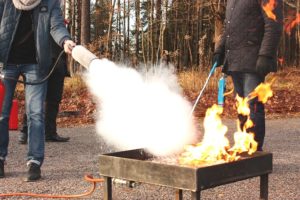
It’s essential to know how to clean up fire extinguisher residue so you can assess the real damage and mitigate health risks.
Did you recently have to discharge your fire extinguisher to put out a small fire in your home or business? Once the fire is out entirely, it’s essential to know how to clean up fire extinguisher residue so you can assess the real damage and mitigate health risks. Here is a guide to cleaning up different types of fire extinguisher residue.
Dry Chemical Extinguisher Residue
Dry chemical fire extinguishers use chemicals such as monoammonium phosphate, sodium bicarbonate, and potassium bicarbonate to fight fires. These agents leave a corrosive residue on surfaces, and it is critical to clean up the powder very quickly. Follow these steps when cleaning up dry chemical fire extinguisher residue:
- Sweep up loose residue.
- Spray leftover residue with isopropyl alcohol diluted with warm water. Let the solution sit for a few minutes, and then wipe with a damp rag.
- For monoammonium phosphate-based extinguishers, neutralize the dry agents with hot water and baking soda. Let the solution set in for a few minutes, and then rinse with water.
- To neutralize residue from sodium bicarbonate and potassium bicarbonate-based, apply a 98 percent hot water solution and 2 percent vinegar. Leave the solution for several minutes, and then rinse with water.
- Clean the surface with soapy water and rinse.
- Blow-dry the area to remove excess water and let it finish air-drying completely.
Class K Wet Chemical Extinguisher Residue
Wet chemical fire extinguishers are used for grease and oil fires that occur in commercial kitchens. They use a salt compound that forms a crust over the flames, eliminating the oxygen supply and reducing the temperatures. If you recently had to extinguish a kitchen fire, follow these steps to clean the mess:
- Turn off all cooking equipment in the area.
- Use a cloth soaked in hot, soapy water to scrub away foamy residue from all surfaces.
- Rinse with clean water and dry thoroughly before turning the equipment back on.
Clean Agent Fire Extinguishers
Clean agent fire extinguishers are non-ozone depleting and non-conductive, making them ideal for putting out fires near electronics that could be damaged by water or corrosive dry chemicals. They are effective against Class A, B, and C fires. These fire extinguishers are great for eliminating fires in areas with sensitive items, such as delicate artwork, library books, or electronic equipment. The firefighting agents evaporate into the atmosphere, leaving no residue behind. So, they require no clean-up after discharge.
Commercial and Residential Fire Prevention from Judd Fire Protection
If you want to ensure your home and business are safe throughout the year, trust Judd Fire Protection, LLC. We have over two decades of experience designing, installing, inspecting, and repairing residential and commercial fire protection systems. We serve clients throughout Maryland, Pennsylvania, Washington, D.C., Virginia, and West Virginia. If you are interested in finding out more about our services and protecting your home and business, give us a call at 410-871-3480 or contact us online. For more fire safety tips, follow us on Facebook, Twitter, and Pinterest.
